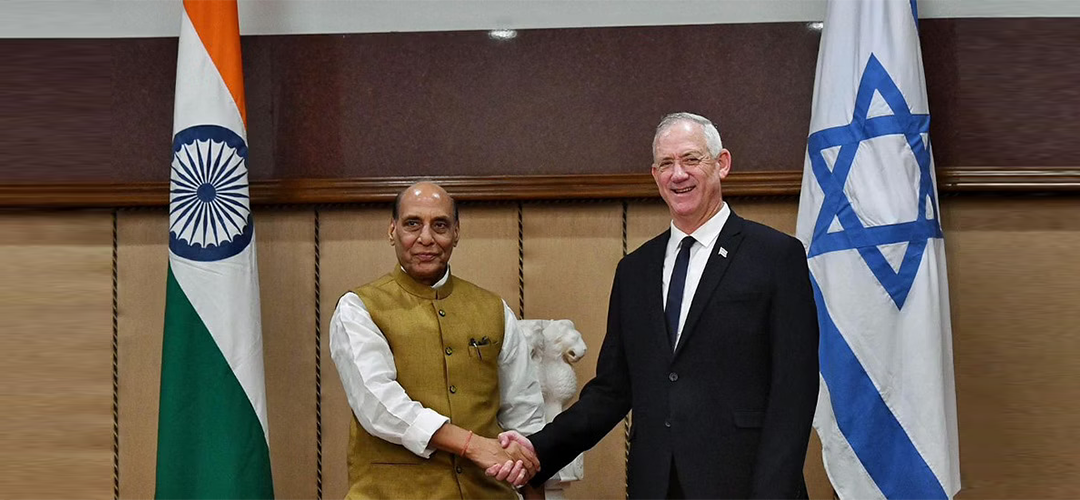GROWING STRONG TOGETHER
June 10, 2022 | Expert Insights

Defence Minister Rajnath Singh holds a bilateral meeting with his Israeli counterpart Benny Gantz at Vigyan Bhawan, in New Delhi on 2 June 2022 | Photo: ANI
On January 30th this year, India and Israel marked 30 years of their full diplomatic relations. To celebrate this significant landmark, on June 2nd, both nations signed a landmark “Vision Statement” to take their defence ties to the next level. The joint declaration is significant as it comes at a time of Israel's growing importance in the Middle East region under the shadow of the ongoing eastern European conflict.
Background
In the early part of their respective national narratives since independence, Indo -Israeli relations were viewed through the prism of India's support for the Palestine Liberation Organisation (PLO). Soon after its independence, India was at the forefront of the struggle to make all occupied and oppressed countries free from the yoke of colonialism and apartheid. India was the first non-Arab state to recognise Palestine Liberation Organization (PLO). Since then, India has played an active role in extending support to the Palestinian cause.
While India recognised Israel as a nation in 1950, relations were hardly diplomatic at the time; normalisation would take another 40 years. However, the tenor of the relationship underwent a silent transformation during the 1962 Chinese invasion of India’s northern borders when Israel reached out to India with military wherewithal, with American blessings. Since then, the relationship underwent cyclic ups and downs as India used its leadership position in the Non-Aligned Group to provide a global stage to PLO leader Yasser Arafat and
publicly decried the Israeli occupation of Palestinian lands. “India has treated Israel like a ‘mistress’- happy to engage intimately in private, but hesitant to acknowledge the relationship in public,” Tanvi Madan, director of the India Project at Brookings Institution in Washington, wrote in 2016.
Mr Modi became the first Indian prime minister to make an official visit to Israel in 2017. Since then, he has taken full ownership of the relationship and has visited territories controlled by the Palestinian Authority, where he interacted with the Palestinian leadership, thus beginning the ‘de-hyphenation’ process. After a long history of careful diplomacy, India seems to be moving towards a more neutral, if not quasi-equal, stance with both. The Russia-Ukraine conflict is a significant factor in this consideration.,
Israeli leaders, on their part, call it “30 years of a wonderful partnership, deep cultural connection and economic and military cooperation.” The arms trade was the bedrock of the bilateral engagement. Israel has been one of India’s top defence partners over the past two decades as a ‘no-questions-asked supplier,’ i.e., it transfers even the most advanced technologies without a limitation.

Country-wise Distribution of Arms Imported by India (1999 - 2018)
Analysis
Both sides recognise the "endless" opportunities for collaboration between the two countries. Collaboration between the two countries would harness Israel's "technological advancement and operational experience" along with India's "extraordinary development and production capabilities," which is in line with the ‘Make in India’ vision.
During an interaction with Synergia Foundation, the Ambassador of Israel to India, defined the relationship as mutually beneficial. “We don't have the patience, and we don't have the capacity in some sense. So, India, in this sense, is fantastic because, from a pure scalability point of view, India's internal market is so vast that it alone allows for scalability. On top of that, we see multinational companies working in and outside of India. So, I think that the cooperation here is really in the right.”
The mutual consensus for strengthened bilateral strategic and defence cooperation showcases that both sides recognise each other's importance in the changing global dynamics. For India, this declaration could signify a shift in the balance in its de-hyphenation policy between Israel and Palestine.
Surprisingly, Israel, despite its strong relationship with the U.S., has faced western diplomatic wrath for being ambivalent in its stance towards Russia after the latter's military incursions into Ukraine. India, with its long-standing strategic partnership with Russia, maintained its neutral stance, mindful of its deep dependence upon Russia for its imported weaponry.
In these unsettled times, seeking alternative sources of military hardware and self-reliance remains a top priority for India. Israel, with its well-established high-tech defence industry, is ideally placed to make India more self-reliant in the field of defence production. However, Israel seeks to break out from the single-minded focus on defence cooperation and agriculture to other fields of business exchanges. It is keen to attract Indian private investments into its domestic markets, especially in high-tech manufacturing. Furthermore, both nations have long suffered from terrorism and could combine forces in terms of intelligence and military training to fine-tune their respective anti-terrorism capacity.
Israel is justifiably proud of its prowess in innovation, and R&D has been the backbone of its technological success. While it has enjoyed access to the latest American weaponry for decades, it has given back to its allies many advanced home-grown technologies, especially in the field of remote surveillance and drone warfare. India could well benefit from sharing such cutting-edge technology, which could give an impetus to its own desire to venture into the designing field.
Assessment
- The steady pace of acceptance of Israel in Middle Eastern diplomatic circles is an added advantage to India as it removes the last hurdles to India’s outreach to Israel. Israel’s growing importance is indicated by the recently concluded "New Quad", of which Israel, India, the US, and UAE are members. This could be appropriately leveraged by India.
- In light of the Comprehensive Economic Partnership Agreement between India and the UAE, fruitful trilateral cooperation between India, Israel and UAE are plausible. This would give greater flexibility to Indian efforts to establish trade relations with Gulf nations.
- Israel enjoys primacy in several high technology fields, especially in military-related technologies. It offers a very strong option to India to find alternative sources for military equipment and develop its own domestic defence production.








Comments